YOLO is immortal! YOLOv9 is released: performance and speed SOTA~
Today’s deep learning methods focus on designing the most suitable objective function so that the model’s prediction results are closest to the actual situation. At the same time, a suitable architecture must be designed to obtain sufficient information for prediction. Existing methods ignore the fact that when the input data undergoes layer-by-layer feature extraction and spatial transformation, a large amount of information will be lost. This article will delve into important issues when transmitting data through deep networks, namely information bottlenecks and reversible functions. Based on this, the concept of programmable gradient information (PGI) is proposed to cope with the various changes required by deep networks to achieve multi-objectives. PGI can provide complete input information for the target task to calculate the objective function, thereby obtaining reliable gradient information to update network weights. In addition, a new lightweight network architecture-Generalized Efficient Layer Aggregation Network (GELAN) based on gradient path planning is designed.
The verification results show that the GELAN architecture has gained significant advantages through PGI on lightweight models. Experiments on the MS COCO data set show that GELAN combined with PGI can achieve better parameter utilization than the state-of-the-art methods based on deep convolution using only traditional convolution operators. PGI's versatility makes it suitable for a wide range of models, from lightweight to large models. With PGI, the model is fully informed, so it is possible to achieve better results using a model trained from scratch than a state-of-the-art model pre-trained on a large dataset.
Article address: https://arxiv.org/pdf/2402.13616
Code link: https://github.com/WongKinYiu/yolov9
Excellent Performance
According to the comparison results of real-time target detectors on the MS COCO dataset, the target detection methods based on GELAN and PGI are significantly ahead of the previous methods trained from scratch in terms of target detection performance. The new method outperforms RT DETR, which relies on large dataset pre-training, in terms of accuracy, and also outperforms YOLO MS based on deep convolution design in terms of parameter utilization. These results indicate that GELAN and PGI methods have potential advantages in the field of target detection and may become important technology choices in future research and applications.
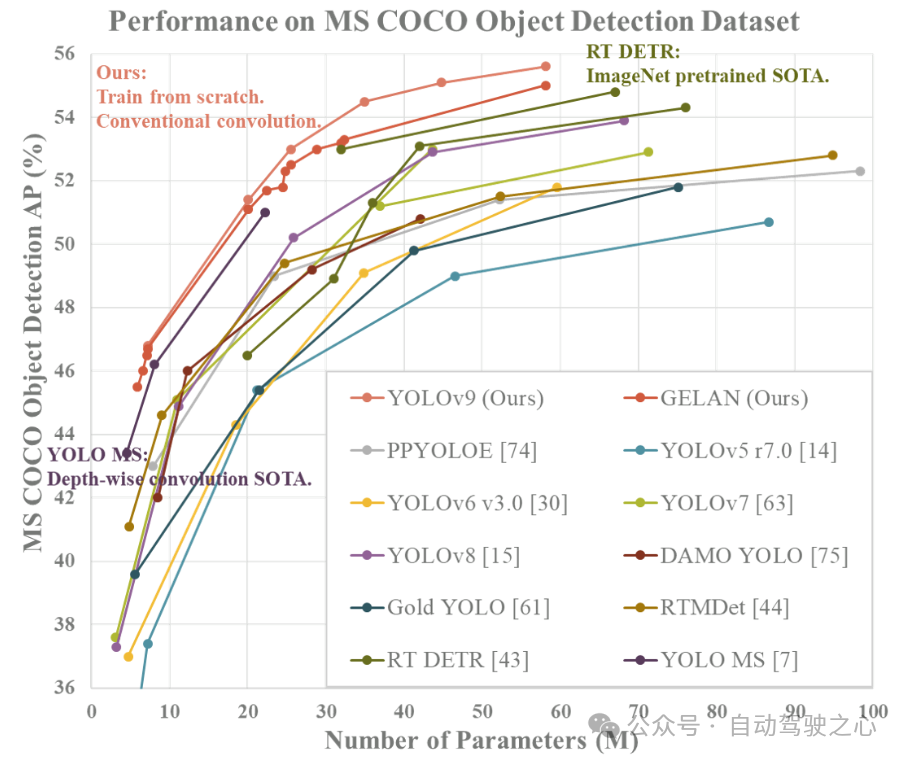
Contributions of this article
- The existing deep neural network architecture is theoretically analyzed from the perspective of reversible functions. Through this This process has successfully explained many phenomena that were difficult to explain in the past. PGI and auxiliary reversible branches were also designed based on this analysis and achieved excellent results. The PGI designed by
- solves the problem that deep supervision can only be used for extremely deep neural network architectures, making the new lightweight architecture truly applicable to daily work.
- The designed GELAN uses only traditional convolutions to achieve higher parameter usage than deep convolution designs based on state-of-the-art technology, while showing great advantages of being lightweight, fast and accurate.
- Combining the proposed PGI and GELAN, the object detection performance of YOLOv9 on the MS COCO dataset greatly exceeds existing real-time object detectors in all aspects.
Method
PGI and related network architecture and methods
As shown in the figure below, (a) Path Aggregation Network (PAN), (b) Reversible Column (RevCol), (c) traditional deep supervision, and (d) Programmable Gradient Information (PGI) proposed by YOLOv9.
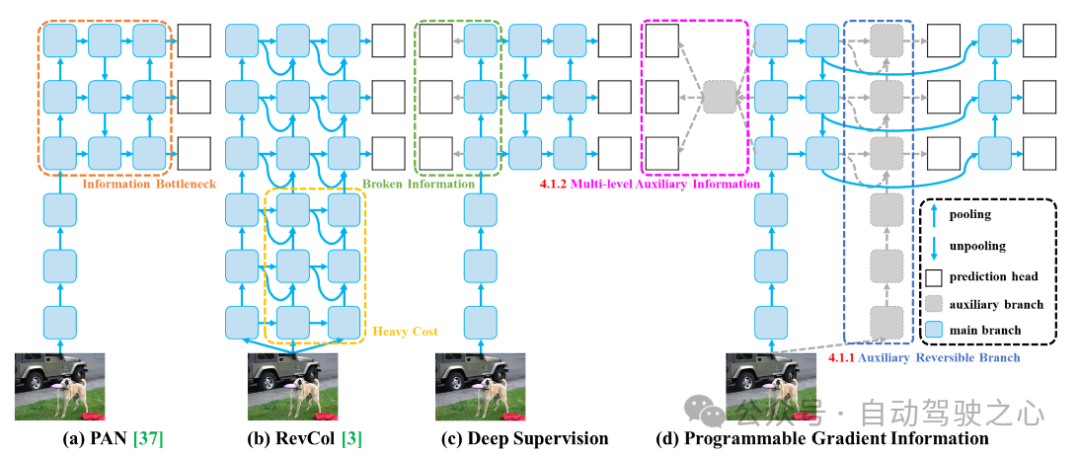
PGI is mainly composed of three components:
- Main branch: the architecture used for inference;
- Auxiliary reversible Branch: Generate reliable gradients for the main branch to transmit backward;
- Multi-level auxiliary information: Control the main branch to learn planable multi-level semantic information.
The architecture of GELAN
As shown in the figure below, (a) CSPNet, (b) ELAN, and (c) GELAN proposed by YOLOv9. It imitates CSPNet and extends ELAN to GELAN, which can support any computing block.
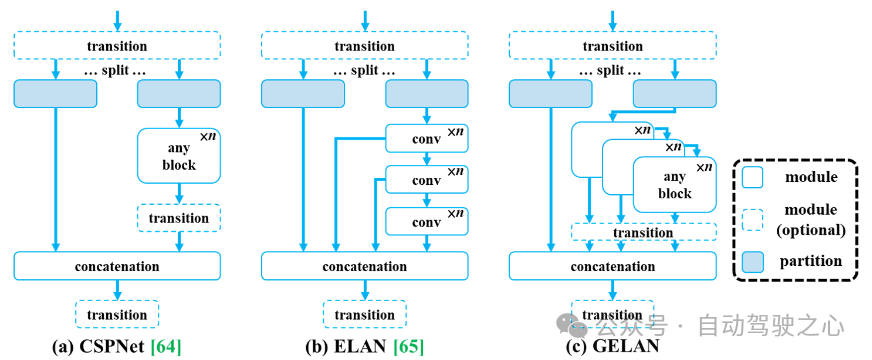
Comparison of results
Comparison with existing technology
The following table lists A comparison of YOLOv9 with other real-time object detectors trained from scratch is presented. Overall, the best performing methods among existing methods are YOLO MS-S for lightweight models, YOLO MS for medium models, YOLOv7 AF for general models, and YOLOv8-X for large models. Compared with YOLO MS of lightweight and medium models, YOLOv9 has about 10% fewer parameters and 5∼15% less calculations, but still has a 0.4∼0.6% improvement in AP. Compared with YOLOv7 AF, YOLOv9-C has 42% fewer parameters and 21% fewer calculations, but achieves the same AP (53%). Compared with YOLOv8-X, YOLOv9-X has 15% fewer parameters, 25% fewer calculations, and a significant improvement in AP, which has increased by 1.7%. The above comparison results show that YOLOv9 is significantly improved over existing methods in all aspects.
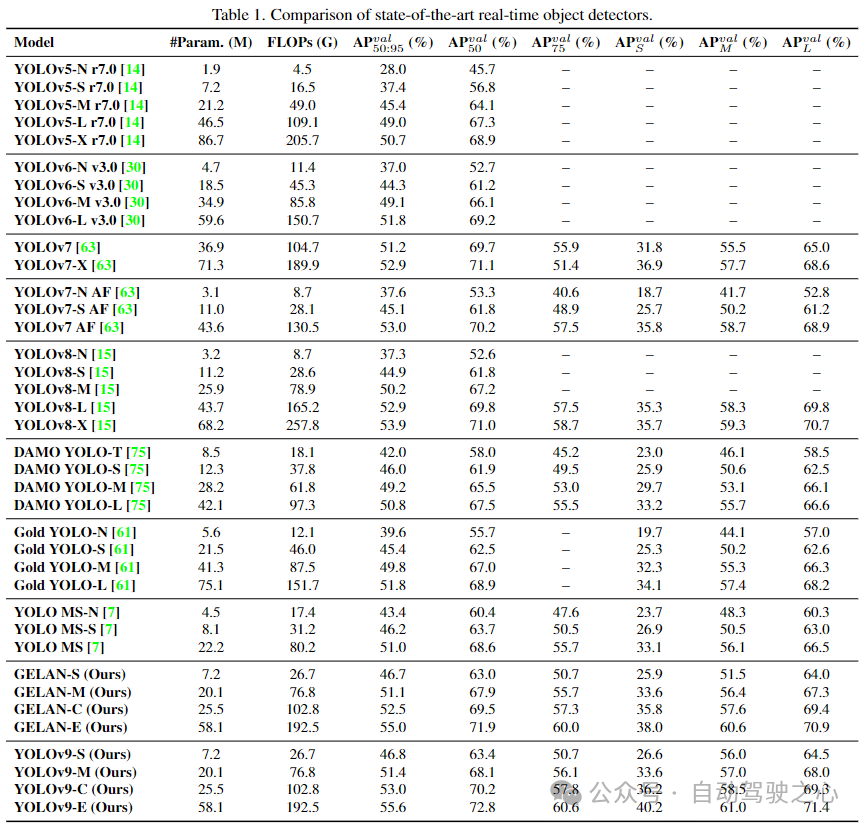
Comparison with the most advanced real-time object detectors
The methods participating in the comparison all use ImageNet as pre-training weights, including RT DETR, RTMDet and PP-YOLOE, etc. YOLOv9 using the scratch training method clearly exceeds the performance of other methods.
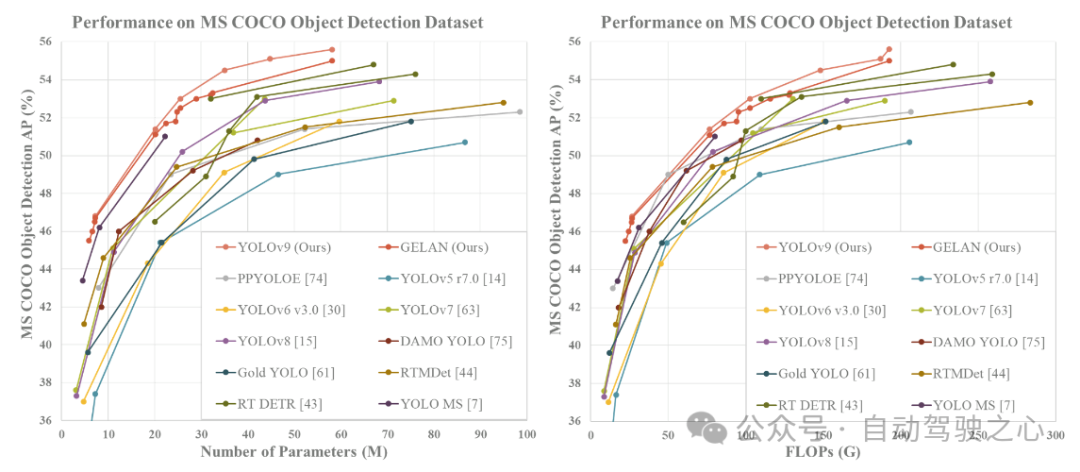
Visualized results
Feature map (visualized results): By PlainNet , Random initial weight output of ResNet, CSPNet and GELAN at different depths. After 100 layers, ResNet starts to produce feed-forward output that is enough to confuse the target information. The GELAN proposed here can still retain quite complete information at the 150th layer, and still has sufficient discrimination ability at the 200th layer.
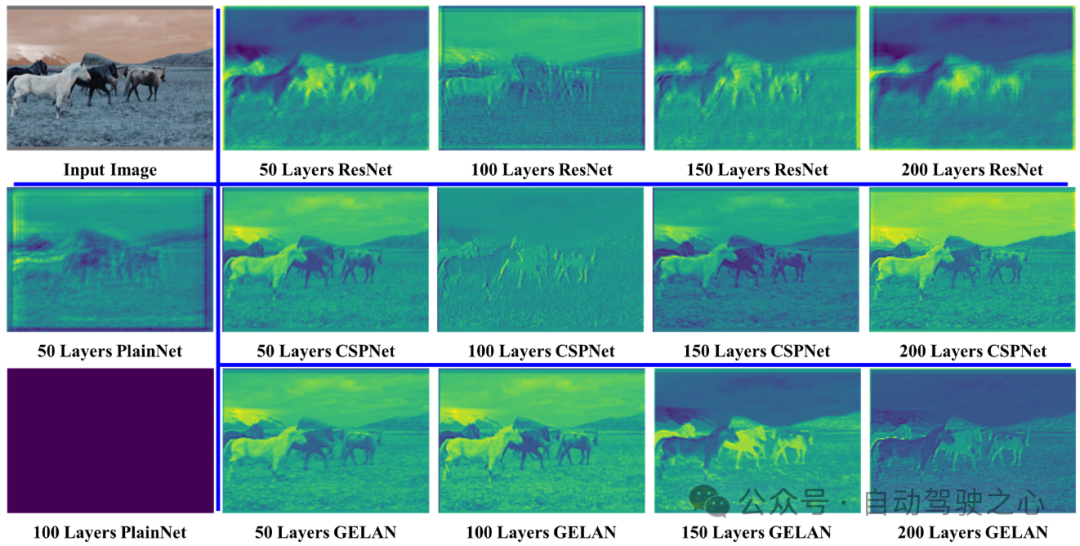
PAN feature maps (visualization results) of GELAN and YOLOv9 (GELAN PGI): After a round of bias warm-up. GELAN had some initial divergence, but after adding the reversible branch of PGI, it was better able to focus on the target object.
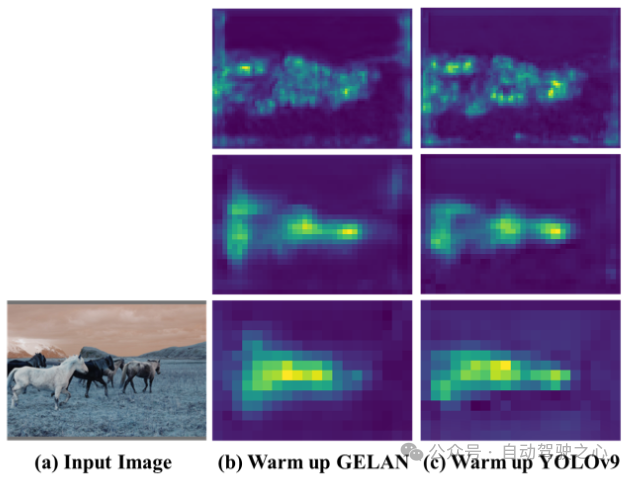
Visualized results of random initial weight output feature maps of different network architectures: (a) Input image, (b) PlainNet, (c) ResNet, (d) CSPNet and (e) proposed GELAN. As can be seen from the figure, in different architectures, the degree of information provided to calculate the loss of the objective function is different, and our architecture can retain the most complete information and provide the most reliable gradient information for calculating the objective function.

Conclusion
This paper proposes to use PGI to solve the problem of information bottlenecks and deep supervision mechanisms that are not suitable for lightweight neural networks. question. designed GELAN, an efficient and lightweight neural network. In terms of target detection, GELAN shows strong and stable performance under different computing modules and depth settings. It is indeed broadly scalable to models suitable for a variety of inference devices. In response to the above two problems, the introduction of PGI enables both lightweight models and deep models to achieve significant improvements in accuracy. YOLOv9, designed by combining PGI and GELAN, shows strong competitiveness. Its excellent design allows the deep model to reduce the number of parameters by 49% and the calculation amount by 43% compared with YOLOv8, but still achieves a 0.6% AP improvement on the MS COCO data set.
Original link: https://mp.weixin.qq.com/s/nP4JzVwn1S-MeKAzbf97uw
The above is the detailed content of YOLO is immortal! YOLOv9 is released: performance and speed SOTA~. For more information, please follow other related articles on the PHP Chinese website!

Hot AI Tools

Undresser.AI Undress
AI-powered app for creating realistic nude photos

AI Clothes Remover
Online AI tool for removing clothes from photos.

Undress AI Tool
Undress images for free

Clothoff.io
AI clothes remover

AI Hentai Generator
Generate AI Hentai for free.

Hot Article

Hot Tools

Notepad++7.3.1
Easy-to-use and free code editor

SublimeText3 Chinese version
Chinese version, very easy to use

Zend Studio 13.0.1
Powerful PHP integrated development environment

Dreamweaver CS6
Visual web development tools

SublimeText3 Mac version
God-level code editing software (SublimeText3)

Hot Topics
 1375
1375
 52
52
 YOLO is immortal! YOLOv9 is released: performance and speed SOTA~
Feb 26, 2024 am 11:31 AM
YOLO is immortal! YOLOv9 is released: performance and speed SOTA~
Feb 26, 2024 am 11:31 AM
Today's deep learning methods focus on designing the most suitable objective function so that the model's prediction results are closest to the actual situation. At the same time, a suitable architecture must be designed to obtain sufficient information for prediction. Existing methods ignore the fact that when the input data undergoes layer-by-layer feature extraction and spatial transformation, a large amount of information will be lost. This article will delve into important issues when transmitting data through deep networks, namely information bottlenecks and reversible functions. Based on this, the concept of programmable gradient information (PGI) is proposed to cope with the various changes required by deep networks to achieve multi-objectives. PGI can provide complete input information for the target task to calculate the objective function, thereby obtaining reliable gradient information to update network weights. In addition, a new lightweight network framework is designed
 The foundation, frontier and application of GNN
Apr 11, 2023 pm 11:40 PM
The foundation, frontier and application of GNN
Apr 11, 2023 pm 11:40 PM
Graph neural networks (GNN) have made rapid and incredible progress in recent years. Graph neural network, also known as graph deep learning, graph representation learning (graph representation learning) or geometric deep learning, is the fastest growing research topic in the field of machine learning, especially deep learning. The title of this sharing is "Basics, Frontiers and Applications of GNN", which mainly introduces the general content of the comprehensive book "Basics, Frontiers and Applications of Graph Neural Networks" compiled by scholars Wu Lingfei, Cui Peng, Pei Jian and Zhao Liang. . 1. Introduction to graph neural networks 1. Why study graphs? Graphs are a universal language for describing and modeling complex systems. The graph itself is not complicated, it mainly consists of edges and nodes. We can use nodes to represent any object we want to model, and edges to represent two
 An overview of the three mainstream chip architectures for autonomous driving in one article
Apr 12, 2023 pm 12:07 PM
An overview of the three mainstream chip architectures for autonomous driving in one article
Apr 12, 2023 pm 12:07 PM
The current mainstream AI chips are mainly divided into three categories: GPU, FPGA, and ASIC. Both GPU and FPGA are relatively mature chip architectures in the early stage and are general-purpose chips. ASIC is a chip customized for specific AI scenarios. The industry has confirmed that CPUs are not suitable for AI computing, but they are also essential in AI applications. GPU Solution Architecture Comparison between GPU and CPU The CPU follows the von Neumann architecture, the core of which is the storage of programs/data and serial sequential execution. Therefore, the CPU architecture requires a large amount of space to place the storage unit (Cache) and the control unit (Control). In contrast, the computing unit (ALU) only occupies a small part, so the CPU is performing large-scale parallel computing.
 'The owner of Bilibili UP successfully created the world's first redstone-based neural network, which caused a sensation on social media and was praised by Yann LeCun.'
May 07, 2023 pm 10:58 PM
'The owner of Bilibili UP successfully created the world's first redstone-based neural network, which caused a sensation on social media and was praised by Yann LeCun.'
May 07, 2023 pm 10:58 PM
In Minecraft, redstone is a very important item. It is a unique material in the game. Switches, redstone torches, and redstone blocks can provide electricity-like energy to wires or objects. Redstone circuits can be used to build structures for you to control or activate other machinery. They themselves can be designed to respond to manual activation by players, or they can repeatedly output signals or respond to changes caused by non-players, such as creature movement and items. Falling, plant growth, day and night, and more. Therefore, in my world, redstone can control extremely many types of machinery, ranging from simple machinery such as automatic doors, light switches and strobe power supplies, to huge elevators, automatic farms, small game platforms and even in-game machines. built computer. Recently, B station UP main @
 A drone that can withstand strong winds? Caltech uses 12 minutes of flight data to teach drones to fly in the wind
Apr 09, 2023 pm 11:51 PM
A drone that can withstand strong winds? Caltech uses 12 minutes of flight data to teach drones to fly in the wind
Apr 09, 2023 pm 11:51 PM
When the wind is strong enough to blow the umbrella, the drone is stable, just like this: Flying with the wind is a part of flying in the air. From a large level, when the pilot lands the aircraft, the wind speed may be Bringing challenges to them; on a smaller level, gusty winds can also affect drone flight. Currently, drones either fly under controlled conditions, without wind, or are operated by humans using remote controls. Drones are controlled by researchers to fly in formations in the open sky, but these flights are usually conducted under ideal conditions and environments. However, for drones to autonomously perform necessary but routine tasks, such as delivering packages, they must be able to adapt to wind conditions in real time. To make drones more maneuverable when flying in the wind, a team of engineers from Caltech
 Multi-path, multi-domain, all-inclusive! Google AI releases multi-domain learning general model MDL
May 28, 2023 pm 02:12 PM
Multi-path, multi-domain, all-inclusive! Google AI releases multi-domain learning general model MDL
May 28, 2023 pm 02:12 PM
Deep learning models for vision tasks (such as image classification) are usually trained end-to-end with data from a single visual domain (such as natural images or computer-generated images). Generally, an application that completes vision tasks for multiple domains needs to build multiple models for each separate domain and train them independently. Data is not shared between different domains. During inference, each model will handle a specific domain. input data. Even if they are oriented to different fields, some features of the early layers between these models are similar, so joint training of these models is more efficient. This reduces latency and power consumption, and reduces the memory cost of storing each model parameter. This approach is called multi-domain learning (MDL). In addition, MDL models can also outperform single
 AI has seen you clearly, YOLO+ByteTrack+multi-label classification network
Apr 14, 2023 pm 06:25 PM
AI has seen you clearly, YOLO+ByteTrack+multi-label classification network
Apr 14, 2023 pm 06:25 PM
Today I would like to share with you a pedestrian attribute analysis system. Pedestrians can be identified from video or camera video streams and each person's attributes can be marked. The identified attributes include the following 10 categories. Some categories have multiple attributes. If the body orientation is: front, side and back, so there are 26 attributes in the final training. Implementing such a system requires 3 steps: Use YOLOv5 to identify pedestrians Use ByteTrack to track and mark the same person Train a multi-label image classification network to identify 26 attributes of pedestrians 1. Pedestrian recognition and tracking Pedestrian recognition uses the YOLOv5 target detection model, and you can train the model yourself , or you can directly use the YOLOv5 pre-trained model. Pedestrian tracking uses multi-object tracking technology (MOT
 1.3ms takes 1.3ms! Tsinghua's latest open source mobile neural network architecture RepViT
Mar 11, 2024 pm 12:07 PM
1.3ms takes 1.3ms! Tsinghua's latest open source mobile neural network architecture RepViT
Mar 11, 2024 pm 12:07 PM
Paper address: https://arxiv.org/abs/2307.09283 Code address: https://github.com/THU-MIG/RepViTRepViT performs well in the mobile ViT architecture and shows significant advantages. Next, we explore the contributions of this study. It is mentioned in the article that lightweight ViTs generally perform better than lightweight CNNs on visual tasks, mainly due to their multi-head self-attention module (MSHA) that allows the model to learn global representations. However, the architectural differences between lightweight ViTs and lightweight CNNs have not been fully studied. In this study, the authors integrated lightweight ViTs into the effective




